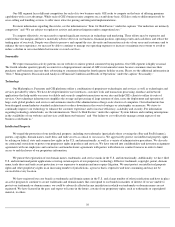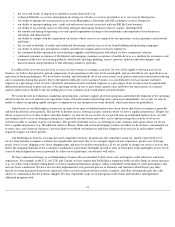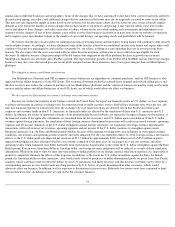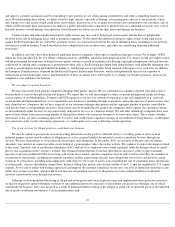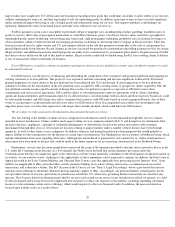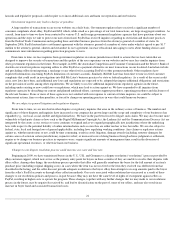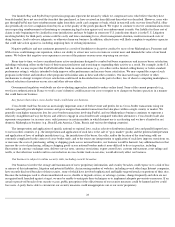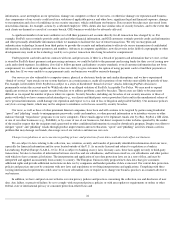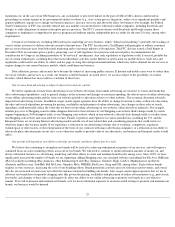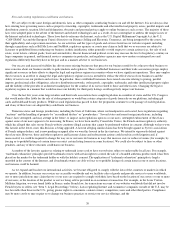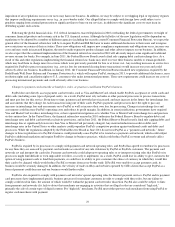eBay 2011 Annual Report Download - page 22
Download and view the complete annual report
Please find page 22 of the 2011 eBay annual report below. You can navigate through the pages in the report by either clicking on the pages listed below, or by using the keyword search tool below to find specific information within the annual report.
Even if PayPal is not currently required to be licensed in some jurisdictions, future localization or targeted marketing of PayPal's service or
expansion of the financial products offered by PayPal (whether alone, through a commercial alliance or through an acquisition) in those countries
could subject PayPal to additional licensure requirements, laws and regulations and increased regulatory scrutiny, any of which may harm
PayPal's business. For example, PayPal expects it will be required to obtain licenses in Japan and Russia to expand its services in those countries.
There can be no assurance that PayPal will be able to obtain such licenses. Even if PayPal were able to obtain such licenses, there would be
substantial costs involved in maintaining such licenses, and PayPal would be subject to fines or other enforcement action if it violates disclosure,
reporting, anti-money laundering, capitalization, corporate governance or other requirements of such licenses. These factors could impose
substantial costs and involve considerable delay to the provision or development of PayPal's products. Delay or failure to receive such a license or
regulatory approval could require PayPal to change its business practices or features in ways that would adversely affect PayPal's expansion plans,
and force PayPal to suspend providing products and services to customers in one or more countries.
PayPal is also subject to various anti-money laundering and counter-terrorist financing laws and regulations around the world that prohibit,
among other things, its involvement in transferring the proceeds of criminal activities. PayPal is focused on compliance with these laws and
regulations and has programs designed to comply with new and existing legal and regulatory requirements. However, any errors, failures or delays
in complying with federal, state or foreign money laundering and counter-terrorist financing laws could result in significant criminal and civil
lawsuits, penalties and forfeiture of significant assets or other enforcement actions. In the United States, PayPal is subject to regulations that
require it to report, within required timeframes, suspicious activities involving transactions of $2,000 or more, and may be required to obtain and
keep more detailed records on the senders and recipients in certain transfers of $3,000 or more. New regulations on prepaid access programs
which take full effect in March 2012 will require PayPal to take additional steps to verify the identity of customers who pre-
fund a PayPal balance.
U.S. regulators have increased scrutiny of compliance with these obligations. Existing and new regulations may require PayPal to revise further its
compliance program, including the procedures it uses to verify the identity of its customers and to monitor international and domestic transactions.
Several countries in which PayPal is regulated, including Australia, Luxembourg and Singapore, have implemented new anti-money
laundering and counter-terrorist financing laws and regulations, and PayPal has had to make changes to its procedures in response. In November
2009, the Australian anti-money laundering and counter-terrorist financing regulator (AUSTRAC) accepted an enforceable undertaking from
PayPal Australia pursuant to which PayPal Australia agreed, among other things, to appoint an independent auditor to assess PayPal Australia's
anti-
money laundering compliance policies and procedures and issue a report identifying any unremediated deficiencies accompanied by a plan by
PayPal to remedy any such deficiencies. In the enforceable undertaking, AUSTRAC expressed concern that PayPal Australia did not have systems
and controls in place to manage adequately its money laundering and terrorist financing risk. In September 2010, the independent auditor
completed its review and issued its report, and PayPal Australia submitted a remediation plan. PayPal Australia has invested in improvements to
its anti-money laundering and counter-terrorist financing systems, policies and operations as part of its remediation plan. In addition, PayPal
Australia will be required to obtain additional information from customers, verify that information, and monitor its customers' activities more
closely. As PayPal continues to localize its services in additional jurisdictions, it could be required to meet standards similar to or more
burdensome than those in Australia. These requirements could impose significant costs on PayPal, cause delay to other planned product
improvements, make it more difficult for new customers to join its network and reduce the attractiveness of its products.
Although there have been no definitive interpretations to date, PayPal has taken actions as though its service is subject to the Electronic
Fund Transfer Act and Regulation E of the U.S. Federal Reserve Board. Under such regulations, among other things, PayPal is required to provide
advance disclosure of changes to its service, to follow specified error resolution procedures and to reimburse consumers for losses from certain
transactions not authorized by the consumer. PayPal seeks to pass most of these losses on to the relevant merchants, but PayPal incurs losses if the
merchant does not have sufficient funds in its PayPal account. Additionally, even technical violations of these laws can result in penalties of up to
$1,000 for each non-compliant transaction or up to $500,000 per violation in any class action, and we could also be liable for plaintiffs' attorneys'
fees. In the second quarter of 2010, two putative class-action lawsuits (Devinda Fernando and Vadim Tsigel v. eBay Inc. and PayPal, Inc. and
Moises Zepeda v. PayPal, Inc.) were filed in the U.S. District Court in the Northern District of California. These lawsuits contain allegations
related to violations of aspects of the Electronic Fund Transfer Act and Regulation E and violations of a previous settlement agreement related to
Regulation E, and/or allege that PayPal improperly held users' funds or otherwise improperly limited users' accounts. These lawsuits seek damages
as well as changes to PayPal's practices among other remedies. A determination that there have been violations of the Electronic Fund Transfer
Act, Regulation E or violations of other laws relating to PayPal's practices could expose PayPal to significant liability. Any changes to PayPal's
practices resulting from these lawsuits could require PayPal to incur significant costs and to expend product resources, which could delay other
planned product launches or improvements and further harm our business.
17





